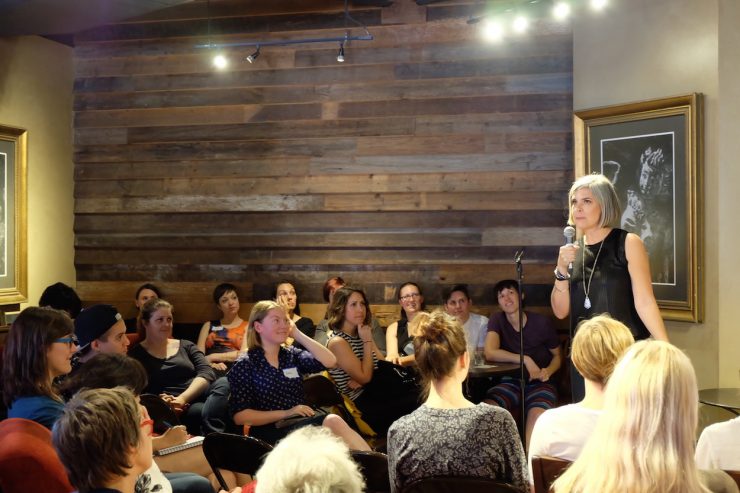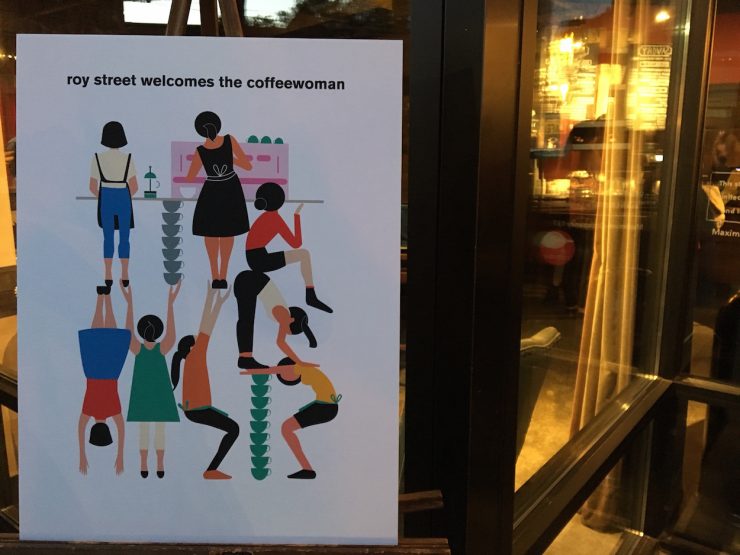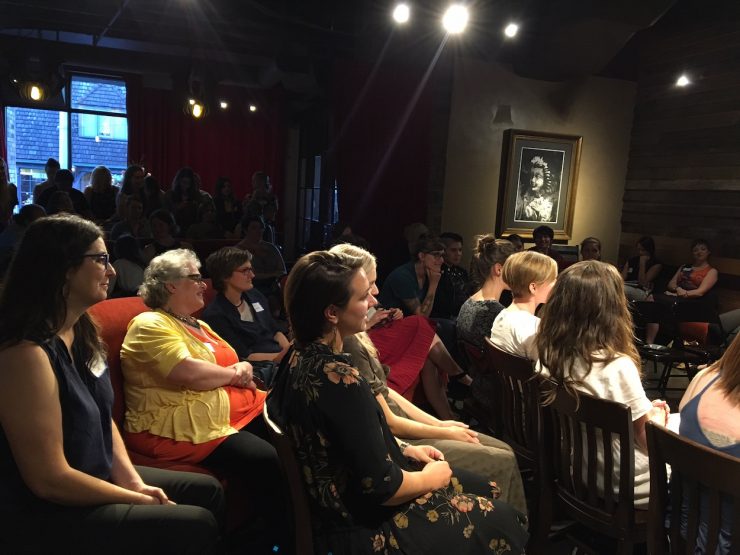Laila Willbur wants to be clear. “It’s not meant to be, let’s get a bunch of girls in the room and bitch about men,” she says. Instead, The Coffeewoman exists to “support, encourage, and inspire” women in the coffee industry.
Exploring the social constructs of gender and coffee in the United States and abroad is a timely conversation that needs to continue. The Coffeewoman is a relatively new voice at the table; the six-month-old project has begun to offer a space for mentorship between established and emerging coffee professionals and has created an important new frame of reference for women getting their bearings when entering the industry.
Maybe most importantly, The Coffeewoman is talking about universal issues that can affect women more often than men, but that resonate with just about everyone, anyplace, at anytime: how not taking risks can hold us back professionally, how building relationships should be everyone’s priority. And how instead of isolating ourselves, female-identifying coffee professionals can do more to help each other succeed along the way.
The standing room only crowd gathered at The Coffeewoman’s August 4 event in Seattle is proof that the project is exploring the role of women in the coffee industry from a positive posture that is generating real interest. Hosted at Starbucks’ Roy Street Coffee & Tea on Capitol Hill, the event explored networking and mentorship and was moderated by Willbur.

Laila Ghambari [File Photo]
The Coffeewoman also found inspiration in Europe’s Barista Connect, and is establishing itself as the American coffee offshoot of similar projects working to support women throughout the hospitality industry, including Toklas Society and journals including Cherry Bombe and Render, the food feminist quarterly.
In contrast to the first Coffeewoman event in Kansas City, programmed as a panel led by moderators, Willbur told me the idea for the Seattle event was “more of a networking mixer, mentorship thing.” The evening started with around 20 mentors talking about their careers and sharing advice they wished they knew when starting out in coffee. It ended with a short Q&A and networking time. Mentors represented both small and large companies across the coffee industry, including importing, roasting, equipment, and sales.
The Seattle mentor group included few women of color, and the topic of racial equality has yet to be raised at the first two Coffeewoman events. When I asked her about diversity in coffee, Willbur said that while ”I don’t want to try to take on everything,” she would “love to support” and help facilitate an event around women of color in the industry if someone is willing to host.
I met Juliana DeCarvalho Anderson while she was weaving through the crowd gathering before the event. Anderson began working as Assistant Buyer at Zoka Coffee nine months ago and came to the event to meet new people and support mentor friends. “It is harder, as you get higher and higher up you can definitely see that it’s a male-dominated field,” Anderson said. “I want to be more exposed to people that are on a higher level of coffee and know that it’s totally possible. Not giving up on the dream really. It’s a long journey.”
I also met Heidi Rasmussen, who talked about working as a service manager for Visions Espresso in the “big phones” and “pager” era of the early ’90s. Now Senior Manager for Education and Quality for illy caffè North America, Rasmussen recalls several times when, as the only woman she knew doing machine maintenance work, she would respond to a call and men would ask her repeatedly if she needed help doing her job. “There were many times when I stood up and said, ‘you called me.’” While decades later she wishes for more female barista competitors, Rasmussen also sees progress with more women moving into coffee careers in technical, equipment, and education.
As the room filled to more than 100, Willbur welcomed the group and invited mentors to speak. Several shared specific job opportunities and encouraged women to apply, regardless of whether or not they feel fully qualified.

Whitney Cornell (La Marzocco)
Whitney Cornell, Vice President of Sales and Marketing for North America at La Marzocco, told the group to “be brave and apply for positions that fascinate you and you’re passionate for,” adding, “the more that you hustle, the more you’ll be recognized for being capable and competent for those roles… that you may not be 100 percent qualified for.”
The idea that women should be bold and clear with career goals was reinforced by mentor Jill Killen, who owns three Seattle cafes including the recently opened Royal Drummer. “You don’t ask, you don’t get,” Killen told the group. “Go out of your way to let your boss know exactly what you want. And what you want to make. And if you don’t find it there, go somewhere else.”
Hanna Neuschwander, Director of Communications for World Coffee Research and occasional Sprudge contributor warned against taking opportunities that offer “some good experience” but don’t pay. “Your skills are valuable,” she shared. “Don’t say yes to everything. Do say yes to the things that are going to get you what you want.”
During the Q&A, one woman in the crowd asked the mentors how women can build each other up, adding that we’re “so good at tearing each other down.” Willbur told the group that early in her career she felt like she was “competing against the girls.” She said, “it took me a while to figure out I’m not a good girl competitor. Or girl barista. I’m a good barista. And a good competitor. Being gender female has nothing to do with how talented we are or how smart we are.“
Kelly Goodejohn, the Director of Global Responsibility and Public Policy at Starbucks, affirmed Willbur’s point. She told the group, “the worst thing that you can do is have a female colleague that’s your competitor. Look at the women around you. Support them. Mentor them. Those younger than you, older than you, and your competition.”
Sarah Dooley, the co-founder of Milk and Coffee and Brand Development Coordinator for Slayer Espresso, was first to speak but brought one of the most memorable messages of the night. “There’s something amazing in our industry that we don’t take advantage of, it’s the [passing on] of guidance and leadership,” she said. “In this room, the people that are willing to give us their ear and their time are unbelievably talented and just waiting to be asked. There are a lot of women in this room that are literally changing the world.”
Sara Billups (@hellobillups) is a freelance journalist based in Seattle. Read more Sara Billups on Sprudge.
The post Support, Encourage, Inspire: At The Coffeewoman’s Seattle Event appeared first on Sprudge.
seen 1st on http://sprudge.com

No comments:
Post a Comment